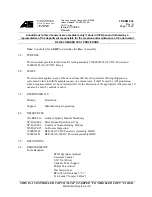
9440300990 Rev J
91
DECS-250
Power System Stabilizer
Power System Stabilizer
The optional (style xPxxxxx), integrated power system stabilizer (PSS) is an IEEE type PSS2A, dual-
input, “integral of accelerating power” stabilizer that provides supplementary damping for low-frequency,
local-mode oscillations and power system oscillations.
PSS features include user-selectable, speed-only sensing, two- or three-wattmeter power measurement,
optional frequency-based operation, and generator and motor control modes.
PSS settings are configured exclusively through the BESTCOMS
Plus
®
interface. These settings are
illustrated in Figure 94, Figure 95, Figure 96, and Figure 97.
BESTCOMSPlus Navigation Path:
Settings Explorer, PSS
HMI Navigation Path:
Settings, PSS
Supervisory Function and Setting Groups
A supervisory function enables PSS operation only when a sufficient load is applied to the generator. Two
separate groups of PSS settings enable stabilizer operation tailored for two distinct load conditions.
Supervisory Function
When PSS control is enabled
A
, a power-on threshold setting
B
determines the level of power (watts) where
PSS operation is automatically enabled. This threshold is a per-unit setting based on the generator
ratings. (The
Configuration
chapter of this manual provides information about entering the generator and
system ratings.) A hysteresis setting
C
provides a margin below the power-on threshold so that transient
dips in power (watts) will not disable stabilizer operation. This hysteresis is a per-unit setting based on the
generator ratings.
Setting Groups
When setting group selection is enabled
D
, a threshold setting
E
establishes the power level where the PSS
gain settings are switched from the primary group to the secondary group. After a transfer to the
secondary gain settings, a hysteresis setting
F
determines the level of (decreasing) power where a transfer
back to the primary gain settings will occur.
Theory of Operation
The PSS uses an indirect method of power system stabilization that employs two signals: shaft speed and
electrical power. This method eliminates the undesirable components from the speed signal (such as
noise, lateral shaft run-out, or torsional oscillations) while avoiding a reliance on the difficult-to-measure
mechanical power signal.
PSS function is illustrated by the function blocks and software switches shown in Figure 85. This
illustration is also available in BESTCOMS
Plus
by clicking the PSS Model Info button located on the
Control tab.
Summary of Contents for DECS-250
Page 2: ......
Page 6: ...iv 9440300990 Rev J Revision History DECS 250 ...
Page 16: ...xiv 9440300990 Rev J Contents DECS 250 ...
Page 20: ...4 9440300990 Rev J Introduction DECS 250 ...
Page 28: ...12 9440300990 Rev J Power Stage DECS 250 ...
Page 32: ...16 9440300990 Rev J Voltage and Current Sensing DECS 250 ...
Page 40: ...24 9440300990 Rev J Synchronizer DECS 250 ...
Page 52: ...36 9440300990 Rev J Auxiliary Control DECS 250 ...
Page 56: ...40 9440300990 Rev J Contact Inputs and Outputs DECS 250 ...
Page 84: ...68 9440300990 Rev J Limiters DECS 250 ...
Page 114: ...98 9440300990 Rev J Power System Stabilizer DECS 250 Figure 96 PSS Parameter Settings ...
Page 124: ...108 9440300990 Rev J Stability Tuning DECS 250 ...
Page 126: ...110 9440300990 Rev J Mounting DECS 250 Figure 103 Overall and Projection Mounting Dimensions ...
Page 127: ...9440300990 Rev J 111 DECS 250 Mounting Figure 104 DECS 250 Escutcheon Plate Dimensions ...
Page 198: ...182 9440300990 Rev J Timekeeping DECS 250 ...
Page 210: ...194 9440300990 Rev J CAN Communication DECS 250 ...
Page 304: ...288 9440300990 Rev J Maintenance DECS 250 ...
Page 316: ...300 9440300990 Rev J Specifications DECS 250 ...
Page 334: ...318 9440300990 Rev J Analog Expansion Module DECS 250 ...
Page 351: ......
















































